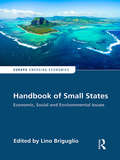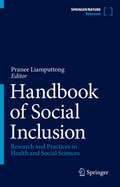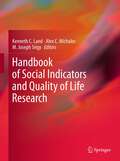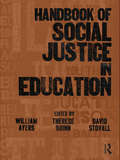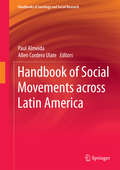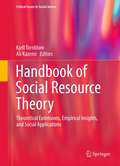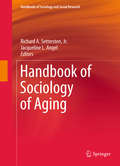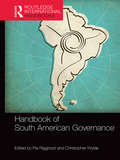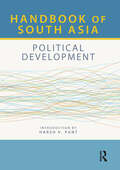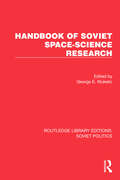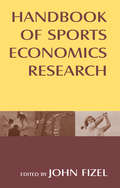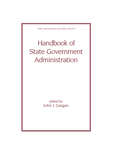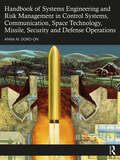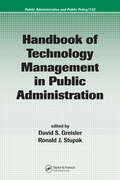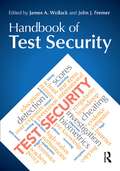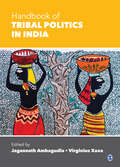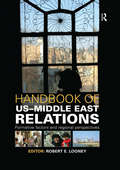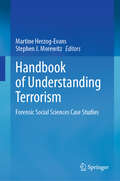- Table View
- List View
Handbook of Small States: Economic, Social and Environmental Issues (Europa Perspectives: Emerging Economies)
by Lino BriguglioThis handbook covers a wide spectrum of issues relating to small states. Chapters in the volume have been grouped under the three main themes of economic, social and environmental issues. The economics sections include chapters dealing with trade, finance and regulatory frameworks, while the social theme covers health, migration, population ageing, as well as overall social wellbeing. The environmental theme examines matters such as measuring environmental performance, natural disasters, the ocean economy, and the validity of the Sustainable Development Goals. One major issue is the definition of small states. As this volume demonstrates, generally speaking, population is used to measure country size in the literature. However, it clearly emerges that there is no real consensus as to the population cut-off point that distinguishes small states from large ones. While the approaches taken by the authors vary, in all cases the chapters draw practical policy implications for small states. The book can therefore be considered as a wide-ranging depositary of information on small states with the aim of deriving policy prescriptions, and thus as an excellent resource for academics, students and policymakers.
Handbook of Social Inclusion: Research and Practices in Health and Social Sciences
by Pranee LiamputtongAddresses the social inclusion/social exclusion paradigm Highlights important theoretical frameworks relating to social inclusion, including social exclusion, social determinants, social justice, human rights, stigma and discrimination, cultural humility, cultural competence, the capability approach, and occupational justice Covers research methodologies that enhance social inclusion, including participatory action research and other inclusive/innovative research methods Includes main research methodologies that researchers can use to promote social inclusion including qualitative research, quantitative methods, mixed methods research, ethics in research, and research dissemination Provides examples of research and programs/interventions that lead to social inclusion of people and communities <P><P><i>Advisory: Bookshare has learned that this book offers only partial accessibility. We have kept it in the collection because it is useful for some of our members. Benetech is actively working on projects to improve accessibility issues such as these.</i>
Handbook of Social Indicators and Quality of Life Research
by Alex C. Michalos M. Joseph Sirgy Kenneth C. LandThe aim of the Handbook of Social Indicators and Quality of Life Research is to create an overview of the field of Quality of Life (QOL) studies in the early years of the 21st century that can be updated and improved upon as the field evolves and the century unfolds. Social indicators are statistical time series "...used to monitor the social system, helping to identify changes and to guide intervention to alter the course of social change". Examples include unemployment rates, crime rates, estimates of life expectancy, health status indices, school enrollment rates, average achievement scores, election voting rates, and measures of subjective well-being such as satisfaction with life-as-a-whole and with specific domains or aspects of life. This book provides a review of the historical development of the field including the history of QOL in medicine and mental health as well as the research related to quality-of-work-life (QWL) programs. It discusses several of QOL main concepts: happiness, positive psychology, and subjective wellbeing. Relations between spirituality and religiousness and QOL are examined as are the effects of educational attainment on QOL and marketing, and the associations with economic growth. The book goes on to investigate methodological approaches and issues that should be considered in measuring and analysing quality of life from a quantitative perspective. The final chapters are dedicated to research on elements of QOL in a broad range of countries and populations.
Handbook of Social Justice Interventions in Education (Springer International Handbooks of Education)
by Carol A. MullenThe Handbook of Social Justice Interventions in Education features interventions in social justice within education and leadership, from early years to higher education and in mainstream and alternative, formal and informal settings. Researchers from across academic disciplines and different countries describe implementable social justice work underway in learning environments—organizations, programs, classrooms, communities, etc. Robust, dynamic, and emergent theory-informed applications in real-world places make known the applied knowledge base in social justice, and its empirical, ideological, and advocacy orientations.A multiplicity of social justice-oriented lenses, policies, strategies, and tools is represented in this Handbook, along with qualitative and quantitative methodologies. Alternative and conventional approaches alike advance knowledge and educational and social utility. To cover the field comprehensively the subject (i.e., social justice education and leadership) is subdivided into four sections. Part 1 (background) provides a general background of current social justice literature. Part II (schools) addresses interventions and explorations in preK-12 schools. Part III (education) covers undergraduate and graduate education and preservice teacher programs, classrooms, and curricula, in addition to teacher and student leadership in schools. Part IV (leadership) features educational leadership and higher education leadership domains, from organizational change efforts to preservice leader preparation programs, classrooms, etc. Part V (comparative) offers interventions and explorations of societies, cultures, and nations.Assembling this unique material in one place by a leading cast will enable readers easy access to the latest research-informed interventionist practices on a timely topic. They can build on this work that takes the promise of social justice to the next level for changing global learning environments and workplaces.
Handbook of Social Justice in Education
by William Ayers Therese Quinn David StovallThe Handbook of Social Justice in Education, a comprehensive and up-to-date review of the field, addresses, from multiple perspectives, education theory, research, and practice in historical and ideological context, with an emphasis on social movements for justice. Each of the nine sections explores a primary theme of social justice and education: Historical and Theoretical Perspectives International Perspectives on Social Justice in Education Race and Ethnicity, Language and Identity: Seeking Social Justice in Education Gender, Sexuality and Social Justice in Education Bodies, Disability and the Fight for Social Justice in Education Youth and Social Justice in Education Globalization: Local and World Issues in Education The Politics of Social Justice Meets Practice: Teacher Education and School Change Classrooms, Pedagogy, and Practicing Justice. Timely and essential, this is a must-have volume for researchers, professionals, and students across the fields of educational foundations, multicultural/diversity education, educational policy, and curriculum and instruction.
Handbook of Social Movements across Latin America
by Paul Almeida Allen Cordero UlateThis handbook covers social movement activities in Latin American countries that have had profound consequences on the political culture of the region. It examines the developments of the past twenty years, such as a renewed upswing in popular mobilization, the ending of violent conflicts and military governments, new struggles and a relatively more democratic climate. It shows that, from southern Chiapas to Argentina, social movements in the 1990s and especially in the 2000s, have reached new heights of popular participation. There is a lack of research on the politics of this region in the contemporary era of globalization, this volume partially fills the void and offers a rich resource to students, scholars and the general public in terms of understanding the politics of mass mobilization in the early twenty-first century. The contributors each address social movement activity in their own nation and together they present a multidisciplinary perspective on the topic. Each chapter uses a case study design to bring out the most prominent attributes of the particular social struggle(s), for instance the main protagonists in the campaigns, the grievances of the population and the outcomes of the struggles. This Handbook is divided into seven substantive themes, providing overall coherence to a broad range of social conflicts across countries, issues and social groups. These themes include: 1) theory of Latin American social movements; 2) neoliberalism; 3) indigenous struggles; 4) women's movements; 5) movements and the State; 6) environmental movements; and 7) transnational mobilizations.
Handbook of Social Resource Theory
by Kjell Törnblom Ali KazemiA "social resource" refers to anything that is transacted between two people. It encompasses both the tangible (such as money and material goods) and the intangible (such as love, respect, information, or services) that are provided or withheld in people's daily lives. The exchange and availability of social resources have a wide range of impacts on everything from health, to quality of life, to social status, to motivation. Understanding Social Resource Theory (SRT) is a key to both Social Psychology (both sociological and psychological), and Public Policy. The framework for the study of SRT is relatively new, beginning with an article by Uriel G. Foa in 1971. Since then, this framework has developed to include new types of social resources and new applications. The Editors of this volume have worked directly with Dr. Foa before his passing, and this volume represents a continuation and development of SRT framework to new applications, including: -Quality of Life -Work Satisfaction -Interpersonal Relationships -Cognitive Development -Consumer Behavior -Cross-Cultural Behavior Contributions to Handbook of Social Resource Theory also integrate SRT with other prevailing Sociological frameworks, including: distributive and procedural justice, social comparison theory, and development of social relationships. SRT has already established a link between social psychology and economics, and this link is explored even further. With clear applications to many fields of study, including Sociology, Social Psychology, Public Policy, and Quality of Life research, this interdisciplinary volume is a clear, systematic, and comprehensive approach to understanding Social Resource Theory, its range of applications, and the future directions of research.
Handbook of Sociology of Aging
by Jacqueline L. Angel Richard A. Settersten Jr.The Handbook of Sociology of Aging is the most comprehensive, engaging, and up-to-date treatment of developments within the field over the past 30 years. The volume represents an indispensable source of the freshest and highest standard scholarship for scholars, policy makers, and aging professionals alike. The Handbook of Sociology of Aging contains 45 far-reaching chapters, authored by nearly 80 of the most renowned experts, on the most pressing topics related to aging today. With its recurring attention to the social forces that shape human aging, and the social consequences and policy implications of it, the contents will be of interest to everyone who cares about what aging means for individuals, families, and societies. The chapters of the Handbook of Sociology of Aging illustrate the field's extraordinary breadth and depth, which has never before been represented in a single volume. Its contributions address topics that range from foundational matters, such as classic and contemporary theories and methods, to topics of longstanding and emergent interest, such as social diversity and inequalities, social relationships, social institutions, economies and governments, social vulnerabilities, public health, and care arrangements. The volume closes with a set of personal essays by senior scholars who share their experiences and hopes for the field, and an essay by the editors that provides a roadmap for the decade ahead. The Handbook of Sociology of Aging showcases the very best that sociology has to offer the study of human aging.
Handbook of Solid Waste Management: Sustainability through Circular Economy
by Seeram Ramakrishna Shikha Baskar Chinnappan Baskar Rashmi Sharma Amutha Chinnappan Rashmi SehrawatThe issue and finding the green solution of Solid Waste Management are important challenges throughout the world. This book explores cutting edge developments in Circular Economy and Sustainability on Solid Waste Management, current research perspectives, existing problems on solid waste management system, industrial development and the latest green methodology for in Solid Waste conversion and regenerate products and materials, environmental solutions, social awareness and development on solid waste management and the future perspectives of Circular Economy for industrial revolution 4.0 with the mission of green chemistry and engineering on solid waste management. It focuses on chapters from different researchers, faculty members, scientists and engineers, industrialist and experts from different countries working on the Circular Economy on Solid Waste Management. It also features the importance of integration of multi-disciplinary research fields on Circular Economy for Sustainable Development. It provides latest development in and current research perspectives, technology development, and critical thinking and societal requirements and development on Circular Economy of Solid Waste Management to researchers, scientists, engineers, environmental managers, policy makers, and Experts of Energy Division of Government and Private Organization and Industries.^
Handbook of South American Governance (Routledge International Handbooks)
by Christopher Wylde Pia RiggirozziGovernance in South America is signified by strategies pursued by state and non-state actors directed to enhancing (some aspect of) their capabilities and powers of agency. It is about the spaces and the practices available, demanded or created to ‘make politics happen’. This framework lends explanatory power to understand how governance has been defined and practiced in South America. Pía Riggirozzi and Christopher Wylde bring together leading experts to explore what demands and dilemmas have shaped understanding and practice of governance in South America in and across the region. The Handbook suggests that governance dilemmas of inequitable and unfulfilled political economic governance in South America have been constant historical features, yet addressed and negotiated in different ways. Building from an introduction to key issues defining governance in South America, this Handbook proceeds to examine institutions, actors and practices in governance focusing on three core processes: evolution of socio-economic and political justice claims as central to the demands of governance; governance frameworks foregrounding particular issues and often privileging particular forms of political practice; and iterative and cumulative processes leading to new demands of governance addressing recognition and identity politics. This Handbook will be a key reference for those concerned with the study of South America, South American political economy, regional governance, and the politics of development.
Handbook of South Asia: Political Development
This Handbook brings together essays that introduce the reader to the key issues in South Asian political development. Written by experts in their respective areas, the essays explore key aspects of political economy, political and economic change, and the complex diplomatic and security challenges of individual countries and the region as a whole. Essays discuss topics as wide-ranging as China’s growing reach in South Asia, political Islam, SAARC and water politics through the region. This well-researched Handbook is an essential reference tool for students and scholars of Political Science, International Relations and South Asian studies.With an introduction by Harsh V Pant.
Handbook of Soviet Space-Science Research (Routledge Library Editions: Soviet Politics)
by George E. WukelicHandbook of Soviet Space-Science Research (1968) provides a comprehensive and authoritative English language summary of Soviet space-science research of the 1960s.
Handbook of Sports Economics Research
by John FizelThe wealth of data available on sports makes the industry a singular laboratory for observing economic and business behavior and theory. This unique reference on sports economics research provides a detailed perspective on the current state of the discipline. Covering both team and individual sports that include tennis, golf, and motor racing, the handbook explores what we know, what we do not know, what is stable, what is changing, what is certain, and what is controversial in sports economics. The expert contributors address issues in particular sports or comparisons among sports along major topics such as revenue and costs, labor markets, market structure, market outcomes, and public policy.
Handbook of State Government Administration (Public Administration and Public Policy)
by John J. GarganDevised to meet the ongoing challenge of identifying the skills and knowledge necessary for expanding the governing capacity of state and local authorities, this book discusses the fiscal consequences of get tough approaches to crime and presents more effective and less expensive policy options. Surveying the range of administrative and management practices employed by state governments, the editor and contributors explore the results of the governmental reform tradition, the impact of federalism and intergovernmental relations, and the effects of political culture on state government by focusing on economic development, welfare, corrections, and environmental programs and policies.
Handbook of Strategic Environmental Assessment
by Barry Sadler Ralf Aschemann Jiri Dusik Thomas B. Fischer Maria R. Partidário Rob VerheemThis authoritative handbook surveys the full breadth and depth of SEA, bringing together a range of international perspectives and insights on the theoretical, methodological and institutional dimensions and practical issues of the field. It then subjects this conventional wisdom to a critical reappraisal, looks at the vast lessons of experience and offers new ideas and interpretations as to where the field is going. The volume is organized into six major sections, beginning with an introduction and overview of the development of the field and a framework for evaluating SEA good practice. Part I comprises a review of SEA frameworks in leading countries (Australia, Canada, New Zealand and the USA), the European Union and developing regions (Africa, Asia, Latin America and Newly Independent States). Part II reviews SEA practice in several major sectors (energy, minerals, transport, water, development assistance and coastal zone management). Part III addresses the linkages between SEA and other comparable tools such as spatial planning and environmental management. Part IV probes key cross-cutting issues in SEA, including how to address cumulative and trans-boundary effects. Part V identifies ways and means of SEA process and capacity development, focusing on how to improve and upgrade the theory and practice of the field. Part VI examines the shift from conventional SEA towards more integrative approaches, drawing on experience and examples from a number of countries. Published with IAIA
Handbook of Systems Engineering and Risk Management in Control Systems, Communication, Space Technology, Missile, Security and Defense Operations
by Anna M. Doro-onThis book provides multifaceted components and full practical perspectives of systems engineering and risk management in security and defense operations with a focus on infrastructure and manpower control systems, missile design, space technology, satellites, intercontinental ballistic missiles, and space security. While there are many existing selections of systems engineering and risk management textbooks, there is no existing work that connects systems engineering and risk management concepts to solidify its usability in the entire security and defense actions. With this book Dr. Anna M. Doro-on rectifies the current imbalance. She provides a comprehensive overview of systems engineering and risk management before moving to deeper practical engineering principles integrated with newly developed concepts and examples based on industry and government methodologies. The chapters also cover related points including design principles for defeating and deactivating improvised explosive devices and land mines and security measures against kinds of threats. The book is designed for systems engineers in practice, political risk professionals, managers, policy makers, engineers in other engineering fields, scientists, decision makers in industry and government and to serve as a reference work in systems engineering and risk management courses with focus on security and defense operations.
Handbook of Technology Management in Public Administration (Public Administration and Public Policy)
by David S. Greisler Ronald J. StupakAll organizations, whether for profit, not for profit, or government, face issues of information technology management. While the concerns involved may differ from organization to organization, the principles of good information technology management remain the same.Using a compilation of articles on various topics relating to technology manage
Handbook of Terrorist and Insurgent Groups: A Global Survey of Threats, Tactics, and Characteristics
by Animesh Roul Scott N. Romaniuk János Besenyő Amparo Pamela FabeHandbook of Terrorist and Insurgent Groups: A Global Survey of Threats, Tactics, and Characteristics examines the most current and significant terrorist and insurgent groups around the world. The purpose is to create a descriptive mosaic of what is a pointedly global security challenge.The volume brings together conceptual approaches to terrorism, insurgency, and cyberterrorism with substantive and empirical analyses of individual groups, organisations, and networks. By doing so, not only does the coverage highlight the past, present, and future orientations of the most prominent groups, but it also examines and illustrates their key characteristics and how they operate, including key leaders and ideologues. Highlighting specific, individual groups, the chapters collectively present a robust and comprehensive outlook on the current geography of terrorism and insurgency groups operating in the world today.This comprehensive volume brings the collective expertise and knowledge of more than 50 academics, intelligence and security officials, and professionals together, all of whom are considered subject experts in their respective areas of research and practice. The volume is based on both desk-based and fieldwork conducted by experts in these areas, incorporating analyses of secondary literature but also the use of primary data including first-hand interviews on the various groups’ regions of operation, their tactics, and how their ideologies motivate their actions.
Handbook of Test Security
by James A. Wollack John J. FremerHigh stakes tests are the gatekeepers to many educational and professional goals. As such, the incentive to cheat is high. This Handbook is the first to offer insights from experts within the testing community, psychometricians, and policymakers to identify and develop best practice guidelines for the design of test security systems for a variety of testing genres. Until now this information was scattered and often resided inside testing companies. As a result, rather than being able to learn from each other’s experiences, each testing entity was left to re-create their own test security wheel. As a whole the book provides invaluable insight into the prevalence of cheating and “best practices” for designing security plans, training personnel, and detecting and investigating misconduct, to help develop more secure testing systems and reduce the likelihood of future security breaches. Actual case studies from a variety of settings bring to life how security systems really work. Examples from both domestic and international programs are provided. Highlights of coverage include:• Best practices for designing secure tests• Analysis of security vulnerabilities for all genres of testing• Practical cheating prevention and detection strategies• Lessons learned in actual security violations in high profile testing programs. Part I focuses on how tests are delivered for paper-and-pencil, technology-based, and classroom testing and writing assessment. Each chapter addresses the prevalence of the problem and threats to security, prevention, and detection. Part II addresses issues essential to maintaining a secure testing program such as planning and monitoring, physical security, the detection of group-based cheating, investigating misconduct, and communicating about security-related issues. Part III examines actual examples of cheating-- how the cheating was done, how it was detected, and the lessons learned. Part III provides insight into security issues within each of the Association of Test Publishers’ four divisions: certification/licensure, clinical, educational, and industrial/organizational testing. Part III’s conclusion revisits the issues addressed in the case studies and identifies common themes. Intended for organizations, professionals, educators, policy makers, researchers, and advanced students that design, develop, or use high stakes tests, this book is also ideal for graduate level courses on test development, educational measurement, or educational policy.
Handbook of Transitions to Energy and Climate Security (Routledge International Handbooks)
by Robert E. LooneyAn original contribution to our understanding of a phenomenon that is reshaping the world, this title thoroughly discusses the transformation of the energy security policy arena brought on by two dramatic developments – the increased potential availability of energy in many parts of the world on the supply side, and on the demand side increasing concerns over the harmful effects on the environment brought on by the use of fossil fuels. An in depth discussion specifically focuses on what energy security means to different countries, and examines which of those countries appear to be managing their energy/climate transitions successfully and which are having a more difficult time adapting to the new environment. Part 1 introduces the topic, covering the main themes and provides an overview of the chapters Part 2 provides a framework for policy evaluation, considering the evolving factors affecting energy security and the energy/climate policy trilemma Parts 3 to 6 discuss energy transitions in the carbon producing countries (Saudi Arabia, Canada, Iran, Russia, Mexico), in intermediate carbon/producing/consuming countries (China, United States, UK, Brazil, Argentina, South Africa), in carbon consuming countries (Germany, Japan, South Korea, Israel, India, Spain) and finally in carbon reduction countries (France, Denmark, Switzerland) Part 7 looks at attempts at regional/international cooperation Part 8 considers the prospects for the future, examining technological breakthroughs. This title builds on the theme of unfolding energy transformations driven by, but increasingly constrained by climate/environmental considerations. It is ideal for researchers and students in the areas of environmental politics and policy, climate change, and energy and climate security, as well as for academics and professionals.
Handbook of Transnational Families Around the World (Handbooks of Sociology and Social Research)
by Deborah Fahy Bryceson Javiera Cienfuegos Rosa BrandhorstThis handbook compiles the most up-to-date research on transnational families. It employs a dialogue between classical approaches and cutting-edge directions in transnational family research to identify continuities and changes in terms of socioeconomic disparities and actors, and to analyze coexistence. Further, the volume adopts a twofold global and international comparative perspective. On the one hand, it focuses on different migratory flows around the world and describes their entangled logics; on the other, it is written by an international group of contributors, with a diverse range of professional backgrounds. Their contributions are based on sound empirical research, and explore geographical regions around the world. The handbook presents different thematic perspectives on transnational families, including an analytical focus on gender, global sociodemographic inequalities, power asymmetries, and border- and mobility regimes, as well as the organization of transnational care, transnational fatherhood, ageing, family reunions and return. It also includes a variety of methodological approaches to transnational family research, ranging from ethnography, biographical research, and life-course methods, to multi-sited approaches and quantitative surveys. Investigating an emergent debate, it sheds new light on migratory fluxes, their common and specific determinants, the types of actors involved, and ways to empirically and methodologically approach them. This is a must-read reference for social scientists interested in family research, migration, and gender studies. Chapter 7 is available open access under a Creative Commons Attribution 4.0 International License via link.springer.com.
Handbook of Transportation Policy and Administration (Public Administration and Public Policy)
by Jeremy F. PlantIn the past few decades, the field of transportation has changed dramatically. Deregulation and greater reliance on markets and the private sector has helped to reconfigure the transport industries, while the rise of intermodal goods and global commerce has produced efficiencies of operation and a greater interdependence among transport modes. In a
Handbook of Tribal Politics in India
by Virginius Xaxa Jagannath AmbagudiaHandbook of Tribal Politics in India is undoubtedly the most authoritative source for a systematic and comprehensive study of this vibrant field of scholarship. Divided into three sections, the chapters cover a broad range of themes ranging from a general introduction to tribal politics to exploring contemporary issues and concerns within the discipline. The book presents a trajectory and authentic overview of tribal politics while keeping in mind the changing relationship between tribal communities and democracy. Using qualitative and quantitative data, it studies the role of tribal political representatives in public policy-making, issues related to communities, and the nature and dynamics of tribal politics at the state and national levels. It explores the patterns, conditions and challenges of tribes’ participation in electoral politics and presents the issues and agendas that will continue to affect the tribal politics in future. This book is an essential resource for teaching and research in political science and other social science disciplines studying comparative political dimensions.
Handbook of US-Middle East Relations: Formative Factors And Regional Perspectives (Routledge International Handbooks Ser.)
by Robert E. LooneyDivided into three sections, the Handbook of US-Middle East Relations provides a thorough and up-to-date overview of contemporary US-Middle East relations in historical perspective. With chapters contributed by leading experts in the field, this Handbook will be of use to academics, students and researchers in international relations, policy analysts, media professionals and government officials. Part I: Factors Affecting US Relations contains essays including Globalization, Energy Security, Wars and Revolution, Peace Processes, US Foreign Aid Policy to the Middle East, and US Relations with Islamic Groups in the Middle East. Part II: Perceptions of US Relations contains essays on how US policies are viewed, including The View from the Arab Street, The View from Palestine, The View from Pakistan and The View from Kurdistan. Part III: US Relations at the Country Level comprise essays detailing relations between the USA and countries and areas in the Middle East and North Africa, including Saudi Arabia, Egypt, Israel, Tunisia, Lebanon, Iran, Iraq, Libya, Algeria and Bahrain. A comprehensive index completes the volume.
Handbook of Understanding Terrorism: Forensic Social Sciences Case Studies
by Stephen J. Morewitz Martine Herzog-EvansThis book examines common theoretical conceptualization of terrorism, including all the following dimensions: Macro-criminological theories Psycho-criminological models of aggression Psycho-criminological models of risk and need (RNR) Psychopathology Social psychology, particularly in the areas of intergroup relations, identity, need for closure, and, the quest for significance Ideological and religious passions and extremism International in scope, each chapter draws on a combination of these frameworks, exemplified in a collection of case series and studies, to help students, practitioners, and researchers better understand these phenomena.
